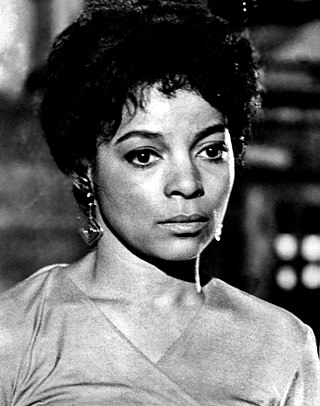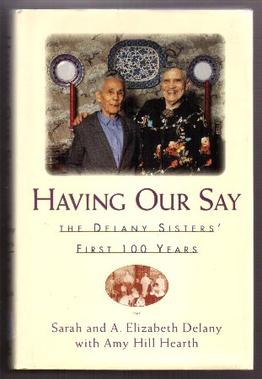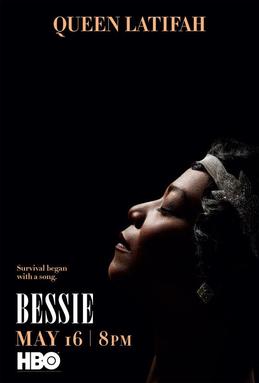
Sarah Louise "Sadie" Delany was an American educator and civil rights pioneer who was the subject, along with her younger sister, Elizabeth "Bessie" Delany, of the New York Times bestselling oral history biography, Having Our Say: The Delany Sisters' First 100 Years, by journalist Amy Hill Hearth. Sadie was the first African American permitted to teach domestic science at the high-school level in the New York public schools. With the publication of the book about the sisters, she became famous at the age of 103.

Diahann Carroll was an American actress, singer, model, and activist. Carroll was the recipient of numerous stage and screen nominations and awards, including her Tony Award in 1962, Golden Globe Award in 1968, and five Emmy Award nominations.
This article lists the winners and nominees for the NAACP Image Award for Outstanding Actress in a Television Movie, Mini-Series or Dramatic Special. Currently, Alfre Woodard holds the record for most wins in this category with six.

Paula Alma Kelly was an American actress, singer, dancer and choreographer in films, television and theatre. Kelly's career began during the mid–1960s in theatre, making her Broadway debut as Mrs. Veloz in the 1964 musical Something More!, alongside Barbara Cook. Kelly's other Broadway credits include The Dozens (1969), Paul Sills' Story Theatre (1971), Ovid's Metamorphoses (1971), and Sophisticated Ladies (1981), based on the music of Duke Ellington, appearing with Gregory Hines and Phyllis Hyman.

Ruby Dee was an American actress, poet, playwright, screenwriter, journalist, and civil rights activist. Dee was married to Ossie Davis, with whom she frequently performed until his death in 2005. She received numerous accolades including two Emmy Awards, a Grammy Award, a Obie Award and a Drama Desk Award as well as nominations for an Academy Award. She was honored with the National Medal of Arts in 1995, the Screen Actors Guild Life Achievement Award in 2000, and the Kennedy Center Honors in 2004.
Lonette Rita McKee is an American actress. She is best known for her role as Sister Williams in the original 1976 musical-drama film Sparkle. McKee also had notable roles in The Cotton Club, Jungle Fever, ATL, and Honey.

Sister, Sister is a 1982 American drama television movie written by Maya Angelou and starring Diahann Carroll, Rosalind Cash, and Irene Cara. The film tells the story of three sisters who come together to decide the fate of their family home after the death of their revered father. Originally filmed in February 1979, the film was shelved for three years before debuting on June 7, 1982, on NBC.
The 36th NAACP Image Awards ceremony, presented by the National Association for the Advancement of Colored People (NAACP), honored outstanding representations and achievements of people of color in motion pictures, television, music, and literature during the 2004 calendar year. The ceremony took place on March 19, 2005 on Fox. It was hosted by Chris Tucker.

Annie Elizabeth "Bessie" Delany was an American civil rights pioneer who was the subject, along with her elder sister, Sadie, of The New York Times bestselling oral history, Having Our Say: The Delany Sisters' First 100 Years, written by journalist Amy Hill Hearth. Delany had earned a Doctor of Dental Surgery (DDS) degree from Columbia University in 1923, and was the second black woman licensed to practice dentistry in New York State. With the publication of the book, she became famous at the age of 101.

Jackie's Back is a 1999 American mockumentary musical comedy television film directed by Robert Townsend and stars Jenifer Lewis in a title role. It also starred Tim Curry, Loretta Devine, Tom Arnold and Whoopi Goldberg. It premiered on the Lifetime Television Network on June 14, 1999. It received NAACP Image Award nomination for Outstanding Television Movie, Mini-Series or Dramatic Special in 2000.
The Briar Street Theatre is a theatre located in Chicago, Illinois, and is home to the long-running Blue Man Group. Originally the carriage house for the Marshall Field and Company horses, the space was purchased by Walter Topel and reconstructed into a theater. The Briar Street Theatre is most notably associated with the Blue Man Group act, which began performing at the Briar Street Theatre in 1997 and, as of January 31st, 2024, is still performing there.
The NAACP Trailblazer Award is presented to a pioneering individual whose theatrical contributions made an outstanding and unique mark in the entertainment industry, therefore, paving the way for others to follow. It is presented part of the NAACP Theatre Awards which commenced in 1991 and presented annually by the Beverly Hills-Hollywood branch of the NAACP to honor outstanding people of color in theatre, following the presentation ceremonies of the NAACP Image Awards.

Having Our Say: The Delany Sisters' First 100 Years is a 1993 New York Times bestselling book that was compiled by Amy Hill Hearth and contains the oral history of Sarah "Sadie" L. Delany and A. Elizabeth "Bessie" Delany, two civil rights pioneers who were born in the late 19th century to a former slave. Their stories were largely unknown until The New York Times reporter Amy Hill Hearth interviewed them for a feature story in 1991, and the popular story was expanded into book form.

The Women in Film Crystal + Lucy Awards—first presented in 1977 by the now–Los Angeles chapter of the Women in Film organization—were presented to honor women in communications and media. The awards include the Crystal Award, the Lucy Award, the Dorothy Arzner Directors Award, the MaxMara Face of the Future Award, and the Kodak Vision Award.

Amy Hill Hearth is an American journalist and author who focuses on uniquely American stories and perspectives from the past. She is the author or co-author of eleven books, beginning in 1993 with the oral history Having Our Say: The Delany Sisters' First 100 Years, a New York Times bestseller for 117 weeks, according to its archives. The book was adapted for Broadway in 1995 and for a film in 1999.

Diandrea Rees is an American screenwriter and director. She is known for her feature films Pariah (2011), Bessie (2015), Mudbound (2017), and The Last Thing He Wanted (2020). Rees has also written and directed episodes for television series including Empire, When We Rise, and Philip K. Dick's Electric Dreams.

Hubert Thomas Delany was an American lawyer and civil rights pioneer, and politician. He served as Assistant U.S. Attorney, the first African American appointed as Tax Commissioner of New York and one of the first African Americans appointed as a judge in New York City. Judge Delany was on the board of Directors for the National Association for the Advancement of Colored People (NAACP), and the Harlem YMCA, and became an active leader in the Harlem Renaissance. He also served as a Vice President of the NAACP Legal Defense and Educational Fund.

Bessie is a 2015 HBO TV film about the American blues singer Bessie Smith, and focuses on her transformation as a struggling young singer into "The Empress of the Blues". The film is directed by Dee Rees, with a screenplay by Rees, Christopher Cleveland and Bettina Gilois. Queen Latifah stars as Smith, and supporting roles are played by Michael Kenneth Williams as Smith's first husband Jack Gee, and Mo'Nique as Ma Rainey. The film premiered on May 16, 2015. By the following year Bessie was the most watched HBO original film in the network's history. The film was well received critically and garnered four Primetime Emmy Awards, winning for Outstanding Television Movie.
The 47th Image Awards, was presented by the NAACP, commemorating roles, talents, and achievements of people of color in film, television, music and literature during the 2015 calendar year. This ceremony was hosted for the third time by Anthony Anderson on the TV One network.

Hubert Douglas Delany is an American politician serving as a member of the Connecticut House of Representatives for the 144th District, representing Stamford, Connecticut. Delany, a Democrat is a U.S. Army sergeant who served as a photojournalist, a writer and, a mass communications specialist.














